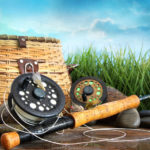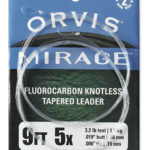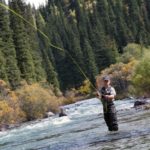Fly fishing for beginners is pretty tough. There seems to be a number of unwritten fly fishing rules that you’re expected to just know. Not knowing them seems to make things even more complicated when you’re just getting started and can lead to unsavory run-ins with other anglers. Trust me, I understand.
After years of teaching fly fishing and angling across the country, I’ve run into my fair share of unwritten rules.
Fly fishing etiquette focuses on being open-minded, patient, and kind to your fellow fly fishers. While often unofficial, anglers respect a set of basic fly fishing rules like right of way and sharing the water to make the experience more enjoyable for everyone.
Read on to discover these unwritten, basic fly fishing rules and etiquette.
Basic Fly Fishing Rules and Etiquette
1. Be Neighborly
It never hurts to be neighborly. This can look like offering tips, fly patterns, or engaging in a quick streamside chat. Taking on a general openness will help improve everyone’s day on the water.
2. Respect River Right of Way
The person going upstream always has the right of way.
When hiking a trail or driving a mountain road, the person going uphill has the right of way because it takes more effort to go up than down. This rule applies to a river as well.
While most rivers won’t have that perceptible of an incline, always remember that anglers working upstream against the flow of water have the right of way.
If you come around a bend and see someone up ahead, leave plenty of space between you and them. It’s better to back off than to close the gap or tag along. And don’t simply leapfrog 50 yards ahead of them upstream. That’s a good way to get a stern talking to.
While most anglers will want to work upstream, steelhead anglers work downstream. That said, the upstream right of way rule still applies.
3. Communicate
When you run into other anglers, ask them what their plan is. This is especially useful if you meet each other heading out of the parking lot. Figuring out a plan ahead of time can resolve the potential for later disagreements.
If there is a disagreement, talking it out is always better than resorting to shouting or physical encounters.
4. Share the Water
Always leave a respectful amount of room between you and other anglers. This is generally the distance that two anglers can fish without impeding the other’s line.
If you might get tangled or you can have a conversation with them, you, or they, are fishing too close.
This same rule applies regardless of which side of the stream you’re fishing on. Don’t assume you’re in the clear just because you’re on the opposite bank.
5. Be Curious
In general, people like to share things that they enjoy or are good at. This is true for most fly anglers.
Asking other anglers about techniques, gear, or tips is almost always welcome. Most fly fishermen especially enjoy sharing tips with new anglers.
Adopt the rule that there are no stupid questions, and you’ll learn excellent tips from strangers wherever you fish.
6. Move Along
As much as you might want to “camp out” in one spot, doing so on heavily pressured waters is rude. Regardless of whether or not you’re catching fish, heavily pressured waters rely on folks taking turns at good holes.
Once you have had a fair shot at a pool, move to the next one in a consistent pattern. This gives the anglers working upstream or down a shot at the same pool.
Of course, on days where you have the water all to yourself, stay as long as you like.
7. Don’t Trespass
Different states treat rivers differently. In Minnesota, Idaho, and many other states river bottoms are considered public property, so anything below the high water mark is public. This is true even if the river travels through private property.
Always thoroughly research the rules where you live and where you plan to fish.
When in doubt, asking permission from a nearby landowner, checking with your local natural resource agency, or talking with other anglers is always preferable to taking your best guess and striking out on your own.
Doing your due diligence ahead of time will prevent misunderstandings or unfortunate run-ins with the law.
8. Leave No Trace
The idea of Leave No Trace is to leave a place just as you found it. This enables the environment to sustain many anglers. At the same time, it lets others that visit the same place enjoy the natural beauty of the area in their own way.
If you want to take this a step further, carry a trash bag on every fishing trip. On the walk out, pick up trash when you see it and put it in the garbage.
This active management of our resources is a small and simple ritual that can have big impacts down the line.
9. Respect the Fish
Whether you’re an angler that prefers catch-and-release or you want to bring home some wild protein for dinner, respect the fish by respecting the environment they live in. Here are a few specific tips.

Catch and Release
Catch and release anglers should:
- wet their hands before touching fish,
- use a net with rubber mesh,
- use barbless hooks,
- and keep the fish in the water as long as possible.
Touching a fish with dry hands can damage their slime coat. The slime coat is a fish’s immune system. If that slime is washed away, the fish can suffer fatal infections.
The same is true of mesh nets. Abrasive, dry fishing nets raked across sensitive fish like trout is sometimes a death sentence. Wet, rubber nets help protect fish.
Barbed hooks can cause jagged wounds that take longer to heal. This is why it’s best to use barbless hooks for catch and release fishing. Barbless hooks are also much easier to remove.
Keeping fish in the water can help reduce fatigue by allowing them to breathe. If fought too long, kept out of the water, or the water temperature is especially warm, a fish may die from lack of oxygen. Always keep them in the water as much as possible.
Catch and Cook
It’s an oversimplification that just keeping fish alive before eating makes the fish taste better. While it’s true that fresh fish tastes the best, the way that a fish is handled, dispatched, and stored can make or break the flavor.
Fish that sit in high stress environments like live wells, coolers, and stringers for a long time build up stress hormones that can impact meat quality.
Respect the fish by dispatching it quickly and immediately put it on ice for the best meat quality.
Related: The Most Ethical Fish to Catch Recreationally (Best Practices)
Overhyped Fly Fishing Etiquette
While there are many low-profile rules that go unnoticed, there are no specific overhyped fly fishing rules. That said, some individuals will have personal pet-peeves that they bring up often and sometimes there will be local expectations in specific areas that you might not know as a visitor.
If you “make a mistake” around someone who is overzealous about a specific rule, talk about it. Don’t let their hyper-focus ruin a moment if you made a mistake in the heat of a great experience. Apologize and move on.
We can’t always predict what will upset another angler and we can never control it. We just have to accept that there will always be soft spots and that some people’s are different.
In this same vein, pay special attention to the unspoken rules surrounding catch and release. Because the goal is to release a fish with as little harm as possible, catch and release anglers can be particularly firm about best practices.
What Not to Worry About
Like any activity, fly fishing has its share of gatekeepers. Some people will swear there’s only one right way to do something and pick on or harass other people who don’t do it.
Beginners tend to get the short end of the stick when it comes to these kinds of people.
At the end of the day, don’t be afraid to make mistakes. If you do make one, apologize, learn from it, and keep on fishing. Decide what feels right for you.
Last Cast
Fly fishing is a great opportunity to remember the golden rule. Treat others the way that you would want to be treated. If you follow these simple reminders, you’ll never have a bad day on the river.
Finally, when fly anglers say goodbye, it’s customary to sign off with, “Tight lines!”
So, tight lines! And have fun on the water.





